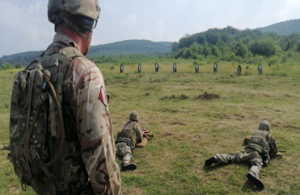RAF completes COVID support task at Kinloss
3 RAF Puma helicopters deployed to Kinloss Barracks to support the Scottish Ambulance Service (SAS) in the coronavirus fight are heading back to their Oxfordshire base today, nearly 3 months after being stood up in support COVID activity in Scotland.
The aircraft and crews from RAF Benson had responded to an urgent request in March from SAS to provide it with an interim ability to move infectious patients by air especially vital to remote highland and island communities during the coronavirus crisis.
RAF Puma just taking flight. MOD Crown Copyright 2020.
The support of the RAF has given the SAS the time to build its own infectious patient air-lift capacity, removing the need for ongoing support from their military colleagues.
MOD Crown Copyright 2020.
The Ministry of Defence can swiftly re-deploy the aircraft in support of the Scottish authorities should future circumstances require them.
While in Scotland, the RAF aircrews have taken advantage of the Scottish mountains and wilderness areas to train for their future operational deployment to Afghanistan.
Copyright RAF Benson.
Maj Gen David Eastman MBE, Commander Standing Joint Command (UK) said:
The deployment of the RAF Puma Task Force shows how quickly we have been able to respond to requests for support from our colleagues in the emergency services across the United Kingdom throughout the battle against the coronavirus.
Our crews have been on 24-hour call and successfully evacuated patients from some of the most remote areas of Scotland. I am extremely proud of the work the Task Force has done and we stand ready to support the Scottish people and Ambulance Service should they need us again.
Pauline Howie, Chief Executive of the Scottish Ambulance Service, said:
We really appreciate the rapid support from the Ministry of Defence and Royal Air Force during the coronavirus crisis. We trained regularly together to establish the best ways of moving adult-sized incubators, called epishuttles, by air.
During this time the Kinloss Pumas transported one critically ill patient from Arran to the mainland, while other fixed wing RAF transport aircraft have also move seriously ill patients from Orkney and Shetland to Aberdeen.
Deputy First Minister John Swinney said:
The Scottish Government is very grateful for the presence of the RAF Puma crews who have been able to assist in a number of operations to move patients in need of urgent medical care. I would like to extend the warmest of thanks to those involved with this deployment and I wish them well for the challenges that lie ahead.
On 18 March 2020, the Defence Secretary announced that 20,000 military personnel were on standby across the UK to support the Civilian Authorities tackle COVID-19. Today there are around 4,000 troops supporting the civil authorities across the UK on 60 separate formal Military Aid to the Civil Authorities (MACA) requests.

